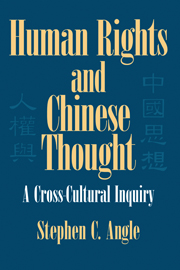Book contents
- Frontmatter
- Contents
- Preface and Acknowledgments
- Chronology
- Chapter 1 Introduction
- Chapter 2 Languages, Concepts, and Pluralism
- Chapter 3 The Consequences of Pluralism
- Chapter 4 The Shift toward Legitimate Desires in Neo-Confucianism
- Chapter 5 Nineteenth-Century Origins
- Chapter 6 Dynamism in the Early Twentieth Century
- Chapter 7 Change, Continuity, and Convergence prior to 1949
- Chapter 8 Engagement despite Distinctiveness
- Chapter 9 Conclusions
- Bibliography
- Glossary and Index
Chapter 7 - Change, Continuity, and Convergence prior to 1949
Published online by Cambridge University Press: 14 August 2009
- Frontmatter
- Contents
- Preface and Acknowledgments
- Chronology
- Chapter 1 Introduction
- Chapter 2 Languages, Concepts, and Pluralism
- Chapter 3 The Consequences of Pluralism
- Chapter 4 The Shift toward Legitimate Desires in Neo-Confucianism
- Chapter 5 Nineteenth-Century Origins
- Chapter 6 Dynamism in the Early Twentieth Century
- Chapter 7 Change, Continuity, and Convergence prior to 1949
- Chapter 8 Engagement despite Distinctiveness
- Chapter 9 Conclusions
- Bibliography
- Glossary and Index
Summary
THE TWO DECADES from the mid-1910s to the mid-1930s saw some progress and much frustration toward the realization of a stable, empowered state and society in China. During the decade and a half after 1935, China would be wracked by invasion and civil war, but 1915 through 1935 were years of enormous intellectual vitality in which theories that could help people to understand and improve their world were subjected to passionate debate and rigorous analysis. They were also years in which Western philosophies were interpreted and adopted with increasing sophistication. Numerous young people studied in and then returned from Western countries, and important American and European thinkers visited and lectured in China.
In such a context, quanli discourse underwent important changes. It lost most of its explicit connections to the Confucian tradition, which itself came under sharp, though often simplistic, attack. The flip side of this increased distance from Confucian vocabulary and sources of authority was the increasingly direct and complete engagement of Chinese writers with themes from contemporary Western rights discourse. If the Confucian source of quanli discourse and the Western stimulus to that discourse were of approximately equal importance during the earlier period we have discussed, that dynamic changes in the 1910s. Western writings are no mere stimuli, but become full-fledged participants in the debates over quanli.
- Type
- Chapter
- Information
- Human Rights in Chinese ThoughtA Cross-Cultural Inquiry, pp. 178 - 204Publisher: Cambridge University PressPrint publication year: 2002



